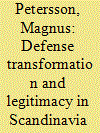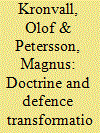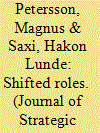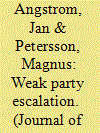|
|
|
Sort Order |
|
|
|
Items / Page
|
|
|
|
|
|
|
| Srl | Item |
| 1 |
ID:
107668


|
|
|
|
|
| Publication |
2011.
|
| Summary/Abstract |
This article analyzes how defense transformation in Scandinavia has been legitimized and which legitimacy it enjoys. The overall result is that it does not have unambiguous support. There are, however, similarities and differences, both between the North Atlantic Treaty Organization (NATO) members Denmark and Norway and nonaligned Sweden, and between the NATO members. Theoretically, the alliance members should be more willing to transform-even if it implies a "denationalization" of defense. In Denmark, that is, with some reservation, the case but not in Norway. Nonaligned Sweden should, according to the same logic, be resistant to downsizing the armed forces and gearing them for NATO expeditionary war fighting operations. However, that is not the case. A consequence of the negative attitude toward the transformation is less influence, resources, freedom of action, and so on, for the defense forces in general, and an even more lukewarm attitude toward conducting combat operations in a NATO context in particular.
|
|
|
|
|
|
|
|
|
|
|
|
|
|
|
|
| 2 |
ID:
146915


|
|
|
|
|
| Summary/Abstract |
In this article we analyse to what degree the three functions of doctrine proposed by Harald Høiback – doctrine as a tool of operations, a tool of education, and a tool of change – have driven defence transformation in two Scandinavian states, Norway and Sweden. We conclude that doctrine, both allied and national, has had some impact on defence transformation in both countries: through the operations in Afghanistan, through education both at the branch level and joint level, and through organizational adaption to (first) the US ‘RMA paradigm’ and (later) to the subsequent ‘COIN paradigm’. However, other factors, such as threat perception and defence spending, have also played an important role. It also remains to be seen whether the changes are ephemeral or of a more permanent nature.
|
|
|
|
|
|
|
|
|
|
|
|
|
|
|
|
| 3 |
|
| 4 |
ID:
076130


|
|
|
| 5 |
ID:
073525


|
|
|
|
|
| Publication |
2006.
|
| Summary/Abstract |
This article deals with Scandinavian intelligence cooperation and its significance for Swedish security policy during the first part of the Cold War. First, the development of the cooperation is described. Second, it is related to a wider context. Third, intelligence in Swedish security policy-making is discussed. Common security interests caused the cooperation. For Sweden, it represented an important part of the wider contacts with the West. Although military intelligence was important for Swedish security policy-making in some respects (e.g. military readiness), it did not have a significant influence in others (e.g. the politicians' threat perceptions). One important reason is the Swedish tradition of weak connections between the political and military leadership.
|
|
|
|
|
|
|
|
|
|
|
|
|
|
|
|
| 6 |
ID:
127107


|
|
|
|
|
| Publication |
2013.
|
| Summary/Abstract |
During their 60 years within the North Atlantic Treaty Organisation (NATO), Denmark and Norway have experienced both high and low standings within the alliance, which can be attributed to both external and internal factors influencing their alliance strategies. During the 'first' Cold War and Détente, 1949-79, Danish and Norwegian alliance strategy aimed to simultaneously deter and reassure the Soviet Union. During the 'second' Cold War, 1979-89, Danish alliance policy became driven by domestic politics, and the Danish government was forced to formally dissociate the country from NATO's policies. Norway was not uncritical, but held a much lower profile. After the Cold War this situation shifted. Denmark successfully rehabilitated itself as a loyal and dependable ally by responding to the call for focusing on out-of-area operations. Meanwhile, Norway's continued focus on the lingering Russian Threat made the country seem out-of-touch with priorities in the post-Cold War alliance, and domestic politics prevented a more active out-of-area engagement.
|
|
|
|
|
|
|
|
|
|
|
|
|
|
|
|
| 7 |
ID:
179509


|
|
|
|
|
| Summary/Abstract |
Small states are often described as weak, and unlikely to achieve their goals when confronted by great powers. However, technologies of the 4th Industrial Revolution, especially autonomous weapon systems combined with artificial intelligence, may enable small states to enhance their security. Therefore, it should be rational for small states to develop strategies based on advances in technology. This article explores three small Scandinavian states – Denmark, Norway, and Sweden – in a comparative perspective of their capability and will to incorporate lethal autonomous weapon systems in their defence forces. Surprisingly, they reflect ambiguous adoption strategies and trajectories.
|
|
|
|
|
|
|
|
|
|
|
|
|
|
|
|
| 8 |
ID:
165102


|
|
|
|
|
| Summary/Abstract |
In this article, we develop the strategic rationale behind weak party escalation against stronger adversaries. There are, we suggest, four main strategies: to provoke a desired over-reaction from the stronger adversary; to compartmentalize conflict within a domain in which the weak party has advantages; to carve a niche with a stronger ally, and to forge a reputation of not yielding lightly. Spelling out these different logics contributes to the literature on small state strategies and escalation. It also suggests, contrary to much of the existing literature, that it can be rational for weak parties to escalate against great powers.
|
|
|
|
|
|
|
|
|
|
|
|
|
|
|
|
|
|
|
|
|